
452 F-Revista de Teoria de la Literatura y Literatura Comparada
Scope & Guideline
Advancing literary discourse through comparative insights.
Introduction
Aims and Scopes
- Comparative Literary Studies:
The journal emphasizes comparative analyses of literature across cultures and languages, focusing on how different literary traditions interact and influence each other. - Theoretical Frameworks:
It explores various literary theories, including post-structuralism, eco-criticism, and feminist theory, to provide deeper insights into texts and their socio-political contexts. - Cultural Critique:
The journal engages with cultural studies, examining literature's role in responding to and shaping cultural identities, narratives, and histories. - Interdisciplinary Approaches:
It encourages interdisciplinary research that connects literature with fields such as philosophy, visual arts, and social sciences, enriching literary studies. - Emerging Literary Forms:
The journal addresses contemporary literary forms and genres, including digital literature and visual narratives, reflecting on their implications for traditional literary studies.
Trending and Emerging
- Ecocriticism and Environmental Literature:
There is a growing focus on ecocriticism, with numerous papers examining the relationship between literature and environmental issues, indicating a response to global ecological crises. - Posthumanism and Digital Narratives:
Emerging themes around posthumanism and the impact of digital technology on literature are gaining traction, highlighting the evolving nature of narrative forms in contemporary society. - Feminist and Queer Theories:
An increasing number of publications are dedicated to feminist and queer theories, exploring gender and sexuality in literature, reflecting broader social movements and discussions. - Crisis Narratives:
The journal is seeing a rise in articles that address themes of crisis—be it political, social, or existential—demonstrating literature's role in grappling with contemporary challenges. - Interdisciplinary Dialogues:
There is a notable trend towards interdisciplinary research that merges literature with visual arts, philosophy, and cultural studies, showcasing literature's interconnectedness with other fields.
Declining or Waning
- Traditional Canonical Literature:
There is a diminishing emphasis on the analysis of classical canonical texts, with fewer articles dedicated to well-established literary works and authors, suggesting a shift towards more contemporary and diverse voices. - Historical Literary Criticism:
The journal has gradually reduced its focus on historical literary criticism, which often examined texts within their specific historical contexts, in favor of more thematic and interdisciplinary approaches. - National Literary Identity:
There appears to be a waning interest in the exploration of national literary identities, as the journal increasingly prioritizes global and transnational perspectives.
Similar Journals

PAMIETNIK LITERACKI
Navigating the Landscape of Literary StudiesPAMIETNIK LITERACKI is a distinguished peer-reviewed journal dedicated to advancing the fields of Literature and Literary Theory, published by WYDAWNICTWO PAN, INST BADAN LITERACKICH PAN in Poland. With an ISSN of 0031-0514 and E-ISSN of 0031-0514, this journal has been operating under an Open Access model since 2012, ensuring wide accessibility and dissemination of scholarly work. The journal has undergone a journey through various categories, currently positioned in the Q4 quartile according to the 2023 category rankings in Literature and Literary Theory, with a Scopus rank of #1009/1106 placing it in the 8th percentile. PAMIETNIK LITERACKI serves as a critical platform for scholars, providing a venue for innovative research, discussions, and reviews that shape the literary discourse in Poland and beyond. For those passionate about literary studies, this journal represents a vital resource for both established researchers and emerging voices in the field.
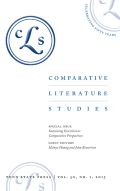
COMPARATIVE LITERATURE STUDIES
Bridging Histories through Literary DialogueComparative Literature Studies is a distinguished journal published by Penn State University Press, focusing on the diverse and evolving field of comparative literature. With an ISSN of 0010-4132 and an E-ISSN of 1528-4212, this quarterly journal has been a critical platform for scholarly dialogue and interdisciplinary research since its inception in 2000. The journal proudly ranks in the Q3 category for Cultural Studies and Q2 for Literature and Literary Theory (2023), showcasing its significant impact within these domains. Notably, it ranks #214/1106 in Literature and Literary Theory according to Scopus, placing it in the 80th percentile—highlighting its relevance and quality in the global academic landscape. Despite its traditional subscription model, the journal remains a crucial resource for researchers, professionals, and students keen on exploring the intersections of cultures, texts, and histories. By publishing cutting-edge research and critical essays, Comparative Literature Studies aims to expand the horizons of literary analysis and foster innovative scholarly exchanges.
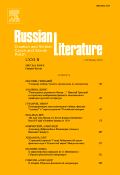
RUSSIAN LITERATURE
Pioneering Research in Russian Literary StudiesRUSSIAN LITERATURE is a premier academic journal published by ELSEVIER, dedicated to advancing the study of Russian literary traditions, critical theory, and cultural contexts. With an ISSN of 0304-3479 and an E-ISSN of 1878-3678, this journal has firmly established itself as a vital resource in the field, achieving a commendable Q1 ranking in Literature and Literary Theory as of 2023. The journal benefits from a strong impact factor and ranks #178 out of 1106 in the Scopus database, placing it in the 83rd percentile of arts and humanities research. RUSSIAN LITERATURE covers an extensive timeline, converging years from 1971 to 1974 and from 1976 to 2023, reflecting its rich academic lineage. Although not an open-access publication, the journal remains influential among scholars, professionals, and students seeking in-depth analyses and critical insights into Russian literature and literary theory. Its commitment to scholarly rigor makes it an essential read for anyone engaging with the complexities of literary studies.
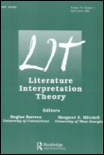
LIT-Literature Interpretation Theory
Challenging Norms, Redefining Interpretation.LIT-Literature Interpretation Theory is a premier academic journal that delves into the intricate relationships between literature and various interpretative theories, published by Routledge Journals, Taylor & Francis Ltd. With an ISSN of 1043-6928 and E-ISSN 1545-5866, this journal has established a notable reputation within the field, evidenced by its ranking in the 71st percentile among peers, and its placement in Q3 of the Literature and Literary Theory category for 2023. Since its inception in 1989 and continuing through 2024, LIT has aimed to provide a platform for the examination of literary texts through diverse theoretical lenses, catering not only to scholars and researchers but also to students and practitioners interested in literary discourse. Although it does not offer open access, the journal continues to be a vital resource for those seeking to enhance their understanding of literary theory within the arts and humanities. With robust insights and critical analyses, LIT contributes significantly to ongoing conversations in literature and promotes innovative interpretations that challenge conventional perspectives.

RIVISTA DI LETTERATURE MODERNE E COMPARATE
Unveiling Diverse Narratives in Contemporary Literary StudiesRIVISTA DI LETTERATURE MODERNE E COMPARATE is a distinguished academic journal published by PACINI EDITORE in Italy, dedicated to the exploration of modern and comparative literature. With an ISSN of 0391-2108, this journal serves as an essential resource for scholars and practitioners engaged in the ever-evolving fields of literature and literary theory. Although the journal currently falls into the Q4 quartile category for 2023, it aims to foster a rich dialogue among researchers, practitioners, and students by publishing innovative and diverse perspectives on contemporary literary issues. The journal is indexed in Scopus, ranking #1045 out of 1106 in the subject area, indicating a niche, yet critical contribution to the literature landscape. Covering converged years from 2002 to 2013 and 2017 to 2024, RIVISTA DI LETTERATURE MODERNE E COMPARATE is vital for those looking to delve deeper into literary analytic methodology and comparative studies, providing an avenue for both new research and established discourse.

NEOHELICON
Cultivating Scholarly Excellence in Literature and BeyondNEOHELICON, published by Springer, is a prominent journal dedicated to the interdisciplinary studies within the field of Arts and Humanities, as well as Law and Social Sciences. Since its inception in 1973, the journal has served as a vital platform for scholars and researchers, showcasing original research, critical analyses, and scholarly debates that contribute significantly to literature and literary theory. With a current impact factor reflecting its influence in academia, NEOHELICON maintains an impressive ranking within Scopus, standing in the 66th percentile for Literature and Literary Theory and achieving Q3 classification across various academic categories in 2023. The journal, published in the Netherlands, operates without an open access option, positioning itself as a critical resource in the advancement of knowledge across these diverse fields. Its convergence of years from 2002 to present highlights a dedicated commitment to ongoing discourse, making NEOHELICON an essential resource for researchers, professionals, and students alike seeking to deepen their understanding of these dynamic disciplines.
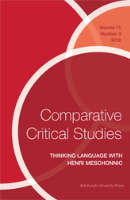
Comparative Critical Studies
Navigating the Global Literary Landscape with Critical PrecisionComparative Critical Studies, published by Edinburgh University Press, is a distinguished journal that serves as a vital platform for scholarly discourse in the fields of Cultural Studies and Literature and Literary Theory. Since its inception in 2004, this peer-reviewed journal has garnered significant recognition, achieving a Q2 rating in Cultural Studies and a prestigious Q1 rating in Literature and Literary Theory according to the 2023 Category Quartiles. With its focus on comparative analyses and interdisciplinary approaches, the journal engages a wide range of perspectives from contemporary scholarship, exploring the intricacies of cultural and literary phenomena. Researchers, professionals, and students alike will find value in its rich repository of critical insights, contributing to a deeper understanding of the global literary landscape. Although the journal operates on a traditional subscription model, it remains accessible to a broad audience, creating opportunities for innovative dialogues and collaborations in the evolving fields of literary and cultural studies. Located in the heart of Edinburgh, a city renowned for its rich literary heritage, the journal continues to foster an environment of academic excellence and cultural critique.
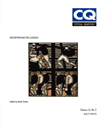
CRITICAL QUARTERLY
Exploring the depths of critical theory since 1959.CRITICAL QUARTERLY, published by Wiley, is a distinguished journal that has been at the forefront of critical discourse since its inception in 1959. With an ISSN of 0011-1562 and an E-ISSN of 1467-8705, it serves as a vital resource in the fields of Cultural Studies and Literature and Literary Theory, demonstrating a commendable influence as evidenced by its placement in Q3 and Q2 quartiles respectively. The journal's impact factor, while not explicitly listed, is inferred from its reputable standing, with Scopus rankings placing it within the 54th and 29th percentiles in its respective categories. By offering a platform for rigorous analysis and diverse theoretical perspectives, CRITICAL QUARTERLY aims to foster scholarly dialogue and advance the study of literature and culture. Situated in the United States, the journal's commitment to academic excellence makes it an invaluable asset for researchers, professionals, and students dedicated to the exploration of critical theory and cultural critique.

Teksty Drugie
Advancing Scholarly Discourse in LiteratureTeksty Drugie is a premier academic journal dedicated to the field of Literature and Literary Theory, published by the Polish Academy of Sciences, Institute of Literary Research. With its issuance beginning in 2008 and extending intermittently to 2020, this journal has been a significant contributor to literary scholarship in Poland and beyond. The journal holds a commendable Q2 ranking in its category for 2023, indicating its influential status amongst peers in the Arts and Humanities realm, and an impressive Scopus rank of #736 out of 934 in the Literature and Literary Theory domain, with a 21st percentile ranking. Researchers and students will find this journal invaluable for its rigorous academic standards and insightful contributions to contemporary literary discourse. While traditionally available through subscription, Teksty Drugie remains an essential resource for those engaged in the study of literature, offering critical theoretical perspectives and a forum for scholarly debate. The journal is located at ul. Nowy Świat 72, Pałac Staszica, Room 1, Warszawa 00-330, Poland.
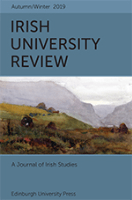
IRISH UNIVERSITY REVIEW
Unveiling the Rich Tapestry of Irish Literary StudiesIRISH UNIVERSITY REVIEW is a distinguished academic journal published by Edinburgh University Press, specializing in the fields of Literature and Literary Theory. With an ISSN of 0021-1427 and an E-ISSN of 2047-2153, this journal serves as a vital platform for scholarly discourse on contemporary and historical literary studies related to Ireland and its cultural contexts. Located in the United Kingdom, the journal has achieved an impressive Q2 ranking in the 2023 category of Literature and Literary Theory, placing it in the 81st percentile among peer-reviewed arts and humanities journals globally, as per Scopus rankings. IRISH UNIVERSITY REVIEW is committed to fostering academic excellence and offers a range of access options for its readers, promoting both traditional and digital scholarship. With a publication timeline extending from 2002 to 2024, the journal is dedicated to enhancing understanding and appreciation of Irish literature through critical essays, reviews, and innovative research, making it an essential resource for researchers, professionals, and students alike.